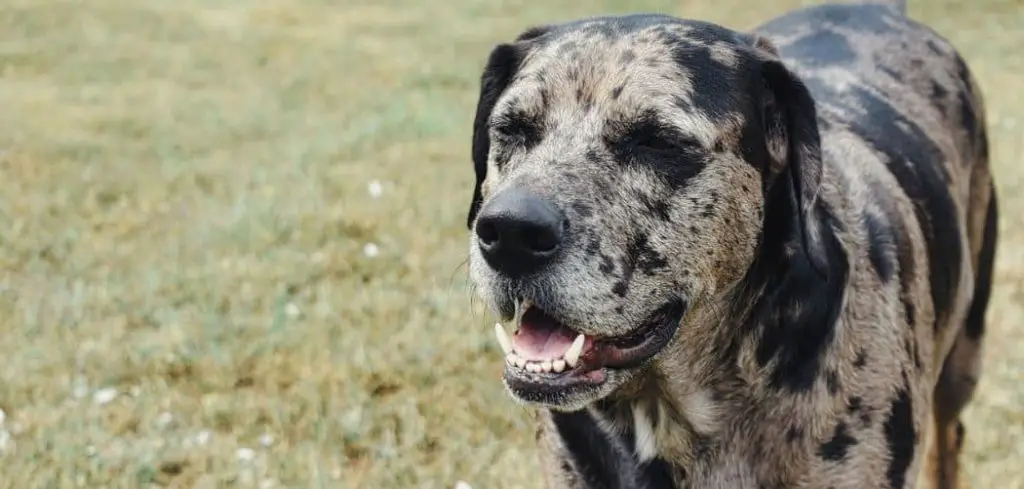Hearing your old dog grind their teeth can be worrying and may indicate discomfort or an underlying health problem.
We outline the common reasons for an old dog grinding their teeth, what you can do at home, and when to seek veterinary help.
Old Dog Grinding Teeth — Why It Happens
Teeth grinding in older dogs can result from a combination of dental, medical, and behavioral factors. Dental pain caused by worn teeth, gum disease, or oral infections is a frequent cause. Other causes include gastrointestinal discomfort, stress, or underlying systemic health issues such as kidney disease or neurological disorders.
Observing the context and frequency of grinding helps determine whether it is a minor behavioral concern or a sign of a more serious medical issue.

Old Dog Grinding Teeth: Common Causes
Dental Disease
Dental disease is a leading cause of teeth grinding in older dogs.
Plaque buildup, gingivitis, and loose or fractured teeth can create discomfort and make chewing painful. Signs to watch for include bad breath, drooling, difficulty eating, and pawing at the mouth.
Untreated dental problems can lead to infections that affect the entire body, so addressing dental health promptly is crucial.
Read more: Old Dog Bad Teeth (Causes and what to do)
Pain or Discomfort
Chronic pain from arthritis, musculoskeletal issues, or oral injuries may cause an old dog to grind their teeth.
You may notice changes in posture, reluctance to move, or sensitivity when touching certain areas.
Grinding may serve as a coping mechanism to relieve tension or discomfort. Identifying and managing the source of pain improves your dog’s quality of life.
Gastrointestinal Upset
Upset stomach, acid reflux, or nausea can trigger teeth grinding in senior dogs.
Other signs include vomiting, diarrhea, drooling, or licking the lips excessively. Addressing digestive issues through diet modification or veterinary treatment can often reduce grinding related to gastrointestinal discomfort.
Stress or Anxiety
Behavioral stress or anxiety may manifest as teeth grinding, especially in environments with noise, changes in routine, or social stressors.
Signs include restlessness, pacing, vocalizations, or increased clinginess. Creating a calm, predictable environment and providing enrichment can help reduce stress-related grinding.
Neurological Disorders
Some neurological conditions, including cognitive dysfunction or nerve issues, may cause involuntary teeth grinding.
Other signs may include disorientation, confusion, changes in sleep-wake cycles, or abnormal movements. Veterinary assessment is essential to identify and manage any underlying neurological problems.
Kidney Disease
Kidney disease in older dogs can lead to nausea, toxin buildup, and discomfort, which sometimes manifests as teeth grinding.
Symptoms may include increased thirst, frequent urination, decreased appetite, or lethargy. Early detection and management of kidney disease can help reduce discomfort and secondary behaviors such as grinding.
What to Do If Your Old Dog Is Grinding Their Teeth
Observe the frequency and context of teeth grinding, noting any accompanying symptoms like drooling, appetite changes, or lethargy.
Maintain regular dental care, including professional cleanings and at-home brushing if possible, to reduce oral pain.
Offer soft or specially formulated senior dog food to make chewing more comfortable if dental issues are present.
Minimize stress and maintain a calm environment, providing familiar routines, quiet resting areas, and mental enrichment.
Track any additional health changes and communicate them to your veterinarian, as teeth grinding may be an early indicator of systemic or neurological problems.
When to Call or Visit Your Vet
Seek veterinary care promptly if your old dog:
- Grinds teeth frequently or continuously, especially during rest.
- Shows signs of pain, discomfort, or difficulty eating.
- Exhibits vomiting, diarrhea, lethargy, or other concerning health changes.
- Displays abnormal behaviors, disorientation, or signs of neurological issues.
Prompt veterinary evaluation ensures that any underlying causes—whether dental, medical, or behavioral—are properly diagnosed and managed to prevent further discomfort or health complications.
Read more: Old Dog Getting Aggressive (Here’s Why)
Key Takeaway
Teeth grinding in an old dog is often a sign of dental discomfort, pain, gastrointestinal upset, stress, or underlying health issues.
Monitoring your dog’s behavior, maintaining dental care, providing a calm environment, and seeking veterinary evaluation are essential steps to ensure your dog remains healthy and comfortable.
Early detection and intervention can prevent complications, reduce pain, and help your senior dog maintain a good quality of life. By staying observant and proactive, you support your dog’s wellbeing through their golden years.
